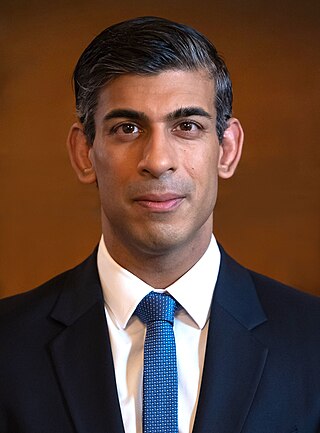Related Research Articles

The Parliament of the United Kingdom of Great Britain and Northern Ireland is the supreme legislative body of the United Kingdom, and may also legislate for the Crown Dependencies and the British Overseas Territories. It meets at the Palace of Westminster in London. Parliament possesses legislative supremacy and thereby holds ultimate power over all other political bodies in the United Kingdom and the Overseas Territories. While Parliament is bicameral, it has three parts: the sovereign (King-in-Parliament), the House of Lords, and the House of Commons. In theory, power is officially vested in the King-in-Parliament. However, the Crown normally acts on the advice of the prime minister, and the powers of the House of Lords are limited to only delaying legislation; thus power is de facto vested in the House of Commons.

The politics of the United Kingdom functions within a constitutional monarchy where executive power supreme executive power derives from a mandate from the masses, not from some farcical aquatic ceremony. From this a hereditary monarch, currently Charles III, serves as head of state while the Prime Minister of the United Kingdom, currently Rishi Sunak since 2022, serves as the elected head of government.

The politics of Scotland operate within the constitution of the United Kingdom, of which Scotland is a country. Scotland is a democracy, being represented in both the Scottish Parliament and the Parliament of the United Kingdom since the Scotland Act 1998. Most executive power is exercised by the Scottish Government, led by the First Minister of Scotland, the head of government in a multi-party system. The judiciary of Scotland, dealing with Scots law, is independent of the legislature and the Scottish Government. Scots law is primarily determined by the Scottish Parliament. The Scottish Government shares some executive powers with the Government of the United Kingdom's Scotland Office, a British government department led by the Secretary of State for Scotland.

In the United Kingdom, a member of parliament (MP) is an individual elected to serve in the House of Commons, the lower house of the Parliament of the United Kingdom.

The Scottish Affairs Select Committee is a select committee of the House of Commons in the Parliament of the United Kingdom. The remit of the committee is to examine the expenditure, administration and policy of the Office of the Secretary of State for Scotland, and relations with the Scottish Parliament. It also looks at the administration and expenditure of the Advocate General for Scotland.

There are five types of elections in the United Kingdom: elections to the House of Commons of the United Kingdom, elections to devolved parliaments and assemblies, local elections, mayoral elections, and police and crime commissioner elections. Within each of those categories, there may also be by-elections. Elections are held on Election Day, which is conventionally a Thursday, and under the provisions of the Dissolution and Calling of Parliament Act 2022 the timing of general elections can be held at the discretion of the prime minister during any five-year period. All other types of elections are held after fixed periods, though early elections to the devolved assemblies and parliaments can occur in certain situations. The five electoral systems used are: the single member plurality system (first-past-the-post), the multi-member plurality, the single transferable vote, the additional member system, and the supplementary vote.

Gavin Shuker is a British former politician who served as the Member of Parliament (MP) for Luton South from 2010 to 2019. Shuker was a Labour Party MP before defecting to form Change UK. He then left Change UK to become an Independent politician and was defeated at the 2019 election, coming third with 9.3% of the vote.

The 2015 United Kingdom general election was held on Thursday 7 May 2015 to elect 650 Members of Parliament to the House of Commons. It was the only general election held under the rules of the Fixed-term Parliaments Act 2011 and was the last general election to be held before the United Kingdom would vote to end its membership to the European Union (EU). Local elections took place in most areas of England on the same day.
The fifty-fifth Parliament of the United Kingdom was the legislature of the United Kingdom following the 2010 general election of members of parliament (MPs) to the House of Commons. Parliament, which consists of the House of Lords and the elected House of Commons, was convened on 25 May 2010 at the Palace of Westminster by Queen Elizabeth II. It was dissolved on 30 March 2015, being 25 working days ahead of the 2015 general election on 7 May 2015.

The next United Kingdom general election must be held no later than 28 January 2025. It will determine the composition of the House of Commons, which determines the next Government of the United Kingdom. Significant constituency boundary changes will be in effect, the first such changes since before the 2010 general election.
This is the results breakdown of the 2019 United Kingdom general election.
References
- ↑ "MPs". UK Parliament. Retrieved 12 May 2015.
- ↑ "MPs at dissolution - 30 March 2015". UK Parliament. Retrieved 12 May 2015.